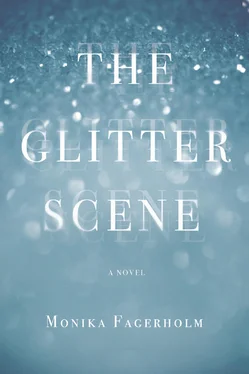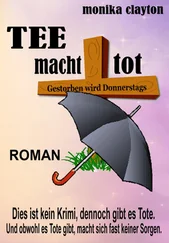Susette with polish on her rag is polishing the rabbits, my love, your love, finding a tiny seed, tiny baby bird under your jacket, light heart little sparrow hopping crow hopping sparrow. “Look, Solveig!” Cannot resist rollicking a little. “Look look!” Holding a rabbit in her hand, over the railing, Solveig far down below, Susette pretending to juggle the rabbit, pretending to throw it dangerously up into the air. Look, Solveig! “Gråhara northwest nineteen, Bulleholm northeast thirteen…” starts rattling off the weather forecast from the company car that morning, it echoes through the house, sings the song, but dearest my little girl don’t tie the bands too hard , “the folk song has many verses, the same thing happens in every one, over and over again, an eternal repetition, look, Solveig!”
“You’re crazy!” Solveig yells loudly too, through the house. “Crazy idiot!”
And then: “NO! Susette!” because it is in that moment that Susette loses her grip on the little glass piece, slippery from the polish, and it slips out of her hands and they both understand what is going to happen, it cannot be stopped. The rabbit that is falling, falling through the whole house and breaks on the floor into millions of small, hard shards that fly everywhere and Solveig is forced to run run away, is barely able to take cover behind a door.
Then silence, a fall day that has come to a standstill—and Solveig is furious of course.
Is silent the rest of the working day, they leave together in silence. On the avenues, the sun that has been covered by the clouds, Solveig walking a few steps ahead, quick, jerking steps, toward the car, Susette who is sauntering after her.
But then, in the middle of everything, Solveig turns around, and you can see that everything is okay again, the anger has blown over.
“Come on now you damned dreamer and idiot. We have to hurry home.”
“Now I remember her,” Solveig says in the company car as they are leaving Rosengården 2 behind.
“Who?”
“Maj-Gun. Maalamaa. The Pastor’s daughter. Because a long time ago, when I was little. She stole an apple. From Doris Flinkenberg. The biggest apple in the fruit basket that Bengt won at the bazaar in the fellowship hall and gave to her. She was stubborn, Doris, had to have everything, though it was a shame about her.”
Maj-Gun Maalamaa, stuck her hand through the cellophane and took the biggest apple.
“They were both very greedy. She did not give in to Doris.” Solveig laughs.
“Then you remember all sorts of cuckoo. Which Doris?”
“This Doris. On the cassette.”
And the girl she walks in the dance with red golden ribbons on Solveig’s tape player in the car. The folk songs.
•
A few days later Susette picks up a white cat at the Glass House on the Second Cape. The French family that had been renting the house as a summer residence have left and Susette is there on behalf of the cleaning company to help with the move: air out bedclothes, dust and roll up rugs, and wrap things in silver paper and pack them in moving boxes for transportation back to the winter residence in the city by the sea. But their summer cat, long haired, white, mixed breed, which the diplomats had adopted from the animal shelter in June, has in some way or another been forgotten.
It is sitting on the kitchen stairs of the locked, abandoned house when Susette returns a few days later: as if it had been waiting for her when she, as if led by a sixth sense, suddenly got the inclination to take the bus from the town center out to the Second Cape one Saturday morning. The wonderful white cat. And what a different cat in comparison to other cats Susette Packlén had, up until then, come across in her lifetime: both of the nursing home cats in the ward for the elderly and infirm where she had worked as a teenager, her very first job. Two peevish cats, siblings with shiny coats, who snuck around the corridors, so calm and at home where they spent their days padding from room to room, bed to bed, from dying person to dying person, but got out their claws and hissed at the very sight of her, “little Susette,” which had been the nursing home manager’s nickname for her.
The white cat is hungry, almost emaciated. So it eats, eats when she comes home with it. “Damned animal torturer,” Maj-Gun establishes at the newsstand about the French family in the Glass House when Susette comes to the newsstand to buy more cat food that same night because all of the grocery stores are already closed and she tells Maj-Gun everything in broad strokes.
Personally Susette does not care that much about the summer family on the Second Cape having abandoned the cat: actually, deep down inside, she is happy. To suddenly have the little white kitty, it is almost like a gift and at the newsstand with Maj-Gun she is suddenly gripped by a great eagerness to show it to someone.
“But come and see it then!” she exclaims and before she knows it she has, in other words, invited Maj-Gun to her home. And then Maj-Gun immediately forgets everything else, lights up and says, almost devoutly, humbly, yes. “You have to give me the address,” she adds later with a small laugh, but still happily so that it does not sound like it would sound otherwise, like a dig because Susette has never asked Maj-Gun to visit her before, during all the years she has lived in her own apartment on the hills north of the town center.
“Oh! Are you still in your pajamas!” Maj-Gun howls when she rings the doorbell that following Sunday, during the morning, not particularly early, certainly at the appointed time, Susette has slept through her alarm. “I’ve come to look at the kitty! Here is my contribution!” Maj-Gun, who purposefully pushes her way into the apartment, has a chocolate swiss roll and ice cream with her and a one-pound package of coffee as well as some family magazines from her newsstand, throws herself down on the love seat in Susette’s tiny living room and immediately starts speaking expertly about everything she knows about various cat breeds and their particular oddities in accordance with what she has read in some magazine “Cat’s World” despite the fact that she is, after all, which she still gets to point out in the same sentence, “really a dog person.”
•
“Must have a little bit of rag doll in it,” Maj-Gun determines. And clarifies: “Rag doll. A rag doll. One of those soft ones. Loose joints. Can easily be confused with characterlessness.” Lifts the cat up into the air in order to demonstrate: and yes, indeed the animal hangs limply and loose limbed, folded double in her grasp. But so, finished with that demonstration, she throws the cat away again, back on the floor with it—as if done discussing this and moving on to other things, things that are more important, more important things that she has on her chest and that certainly, in her opinion, are the real reason for her visit, naturally, in addition to, as a guest you don’t diet , drinking coffee and stuffing herself with as much chocolate swiss roll as possible.
Like, for example, the magazines she has with her then. “Family magazines.” Which Maj-Gun underlines so you can hear that she has thought out everything she is going to say ahead of time and cheered herself at the shrewdness in it:
“Magazines for the entire family . It can be informative to read about what the rest of mankind is up to, don’t you think?”
With reference, of course, to their mutual solitary situation in that regard.
Humorously said, but still, the smile that Susette has had ready at the corners of her mouth freezes, ebbs out, and she suddenly stops in the middle of everything. Because in exactly this moment it is as if it hit her with full force. That humbug . Maj-Gun, everything. And not because of the talk or even because of the cat, which Maj-Gun pretended to be interested in at the newsstand but which she is now barely paying attention to when she is actually here, rather everything she knows about it. You understand that THAT is not meant so seriously, as usual Maj-Gun’s know-it-all attitude of the well-known type that, in and of itself, could sometimes even be entertaining to listen to at the newsstand.
Читать дальше











